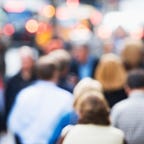Covid-19 Detectors that Track you
While the pandemic has changed our way of life it has allowed tech companies to develop more ingenious methods of mass surveillance under the cover of fighting the virus.
Now, wearable devices have become the state-of-the-art in tracker technology.
One university in Michigan issued students with a device to log skin temperature once a minute in the hope of detecting early signs of the virus.
Employees at Rent-A-Center recently started wearing proximity detectors that log details of their close contacts and alert them to possible virus exposure.
In Knoxville, students on a University football team wear proximity trackers under their shoulder pads during games, allowing the team’s medical director to trace which players may have spent more than 15 minutes near a teammate or an opposing player.
Sports leagues, factories and nursing homes have already deployed these wearable gadgets, resorts are rushing to adopt them and a few schools are preparing to try them.
The conference industry is eyeing them as a potential tool to help reopen convention centers.
The use of this technology is in its infancy says Laura Becker, research manager at the International Data Corporation, a market research firm. “If it works, the market could be huge because everyone wants to get back to some sense of normalcy.”
The drawback of course is this tech cannot track people who asymptomatic.
There are also smartphone virus-tracing apps able to detect a user’s proximity, but the new wearable trackers are geared for factory workers who cannot use their phones, or sports teams whose athletes spend time in close proximity.
Civil rights and privacy experts warn continuous use of these monitoring devices could lead to new forms of surveillance that extend well beyond the pandemic, vying with that of Google and Facebook to become the new norm.
They caution that sensors on some wearable tracking devices could allow employers, colleges or law enforcement agencies to reconstruct people’s locations or social networks, affecting their ability to meet and speak freely.
Certain groups and individuals might be more vulnerable to the risk of data mining as well.
“A lot of colleges are doing masks and social distancing,” said Tyler Dixon, a senior at a school who started a petition, “but this seemed like one step too far.”
